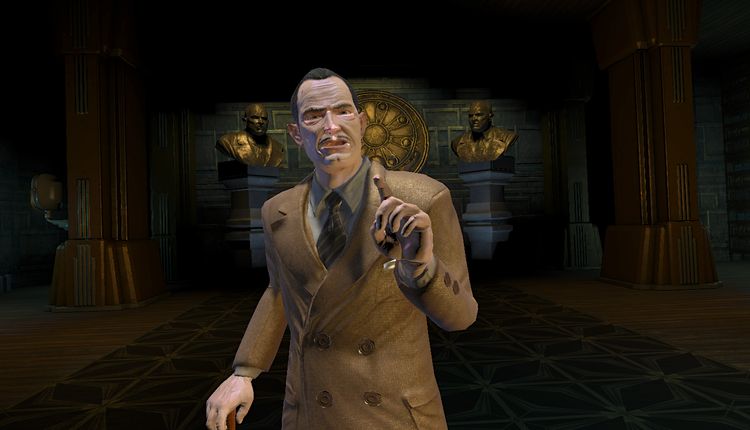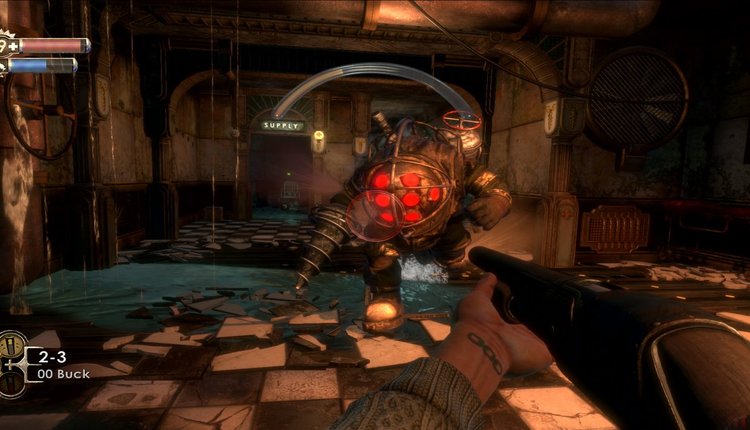“A Man Chooses, A Slave Obeys” | BioShock at 10
A true signifier of just how influential a property has been is how utterly sick you’ve become of seeing its tropes, themes and aesthetics show up in every subsequent copycat. There is arguably no Triple-A game in the last decade which has embodied this more than BioShock. From its FPS with mild RPG-elements gameplay to the retro-alternate-history visual and aural kitsch; almost every game that dares have a similar play-style cannot but end up unfavourably compared or outright trying to recreate it, however utterly misguided that course of action is.
The problem with copying BioShock is much like when other film studios copy Marvel; the appeal of the property is more than the sum of its parts. Merely alluding to a wider universe doesn’t make your film watchable, The Mummy, and simply littering your game with audio-logs and pseudo-philosophical musings doesn’t make you BioShock. The fallen city of Rapture was bursting with character and visual diversity, with each new section of the game offering up a different atmosphere or design sense while still remaining true to an overall stylistically coherent whole. More than that though, the setting told the story of its own world.
There’s no denying it was worth your while collecting all the audio-logs to fully flesh out the world and the tale of its denizens as they descended into addiction, psychosis and murder but even if you didn’t, you still implicitly understood the story of what happened in Rapture because the world itself told you and wove it into the gameplay.
The dispensaries on every corner, the way the wealthier members of that society horded plasmids in safes etc; all demonstrating a populace obsessed with these highly dangerous and addictive DNA-altering substances. To say nothing of the violence, blood and depravity written on the walls and the broken bodies of those who attack you in a desperate attempt to survive in a city that was slowly being reclaimed by the sea it hubristically tried to tame.
That setting-as-storytelling remains the game’s crowning achievement, still arguably unsurpassed to this day. Batman: Arkham Asylum is one of the few games which debatably came close to replicating a similar formula but that example is somewhat cheating as it had the benefit of the Dark Knight’s rogues gallery and the likes of Mark goddamn Hamill lending his voice to the audio logs.
BioShock created an original world you wanted to keep exploring; to see each new facet and design quirk of, and populated it with its own cast of characters which it created from scratch who proved themselves memorable and engaging without any ‘holy brand recognition, Batman’. (Sander Cohen you magnificent, repulsive bastard.)
[perfectpullquote align=”full” bordertop=”false” cite=”” link=”” color=”#70006C” class=”” size=”19"]”There are precious few villains in modern gaming who have stayed in the collective memory the way Ryan has”[/[/perfectpullquote]p>
While watching game after game create bland, unengaging environments bukakked with dull audio/text logs adding little to the experience but white noise was bad enough, BioShock’s greatest accidental legacy/crime was burdening Triple-A games with pseudo-philosophy.
Ken Levine imbued the game with a well thought out and interesting deconstruction of Randian Objectivism which in turn was used to implement one of the best twists the medium has ever managed precisely because it could only have the effect it had *in* a videogame. (If you’ve not played the game, it’s rather difficult to describe the twist in words but suffice to say it’s worth playing in part just to experience it as it’s a very entertainingly unsettling comment on freewill and player agency in particular.)

Again, there are a few examples of subsequent blockbuster games who managed to effectively follow BioShock’s literary leaning and thread their themes through the world, gameplay and experience – Spec Ops: The Line is perhaps the true successor on this front, right down to the twist which makes you want to stop playing – but most imitators have settled for merely having a morally repugnant villain backed up by a work of literature one of the developers skimmed while they were an arts undergrad. Not so for Rapture’s iconic leader.
If you took the time to immerse yourself in Rapture and the in-game lore the logs etc provided, you were under no illusions that Andrew Ryan was a monster and a villain to easily hate. Yet even this was in part to do with the twist and upon finally meeting Ryan, it was hard not to have a begrudging respect for his commitment to his philosophies (even if said philosophies were monstrous). He was no cartoonishly evil, cackling butcher.
He was a living embodiment of Ayn Rand’s unworkable beliefs and by the time the twist is fully revealed he’s shown to be a rare villain willing to die so see his beliefs vindicated. Sadly the truly compelling portion of the story dies with him and while the ‘real’ villain – Atlas – is fine, the game’s final portion is lacking both the invention and narratively engrossing push of everything leading up to the confrontation with Ryan. There are precious few villains in the modern era of gaming who have stayed in the collective memory of players the way Ryan has.

It seems odd to focus so much of this anniversary piece on almost every aspect of the game other than the gameplay itself but ultimately it’s in those areas where the game excelled and that’s what lingers most in people’s recollections of the game. You remember those prickly, Psycho-esque strings during some of the more tense moments, or the look of the entryway and the speech Ryan gives over the intercom as you descend.
While the gameplay was good, meaty satisfying action, BioShock was a master-class in storytelling, mood and atmosphere. The solid, often hectic shootouts were tremendous fun – for let us not forget, you could shoot bees from your hands – but if that hadn’t been in service of the detailed world you were traversing, it wouldn’t be worth a damn.
Of course, the lesson the industry should have taken ideally would have been to create unique, engaging and detailed worlds to set your games in. Instead they simply copied the basic elements and hoped they’d just make the next BioShock by accident. They never strove to stand out but rather were content to follow the leader. And as someone once said; “A man chooses, a slave obeys”.

